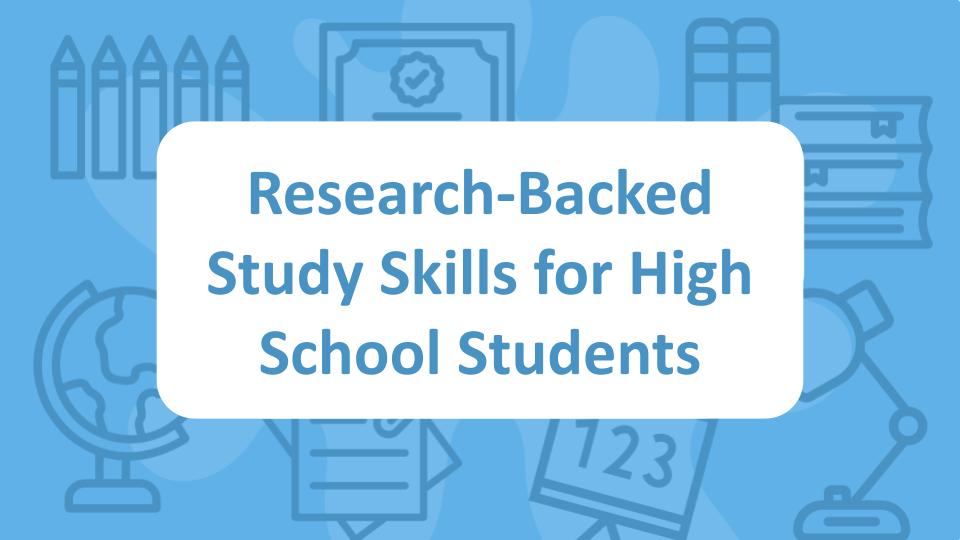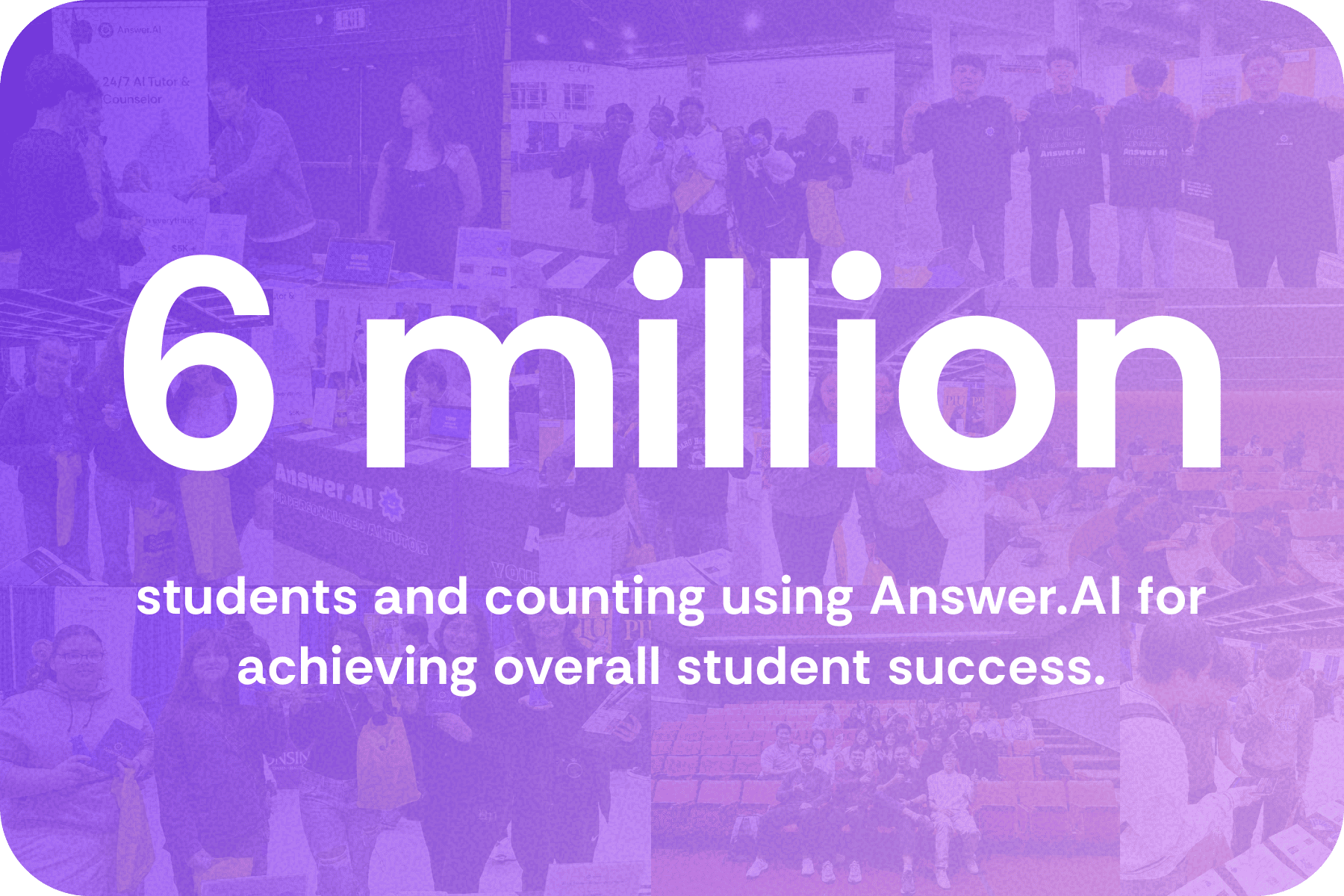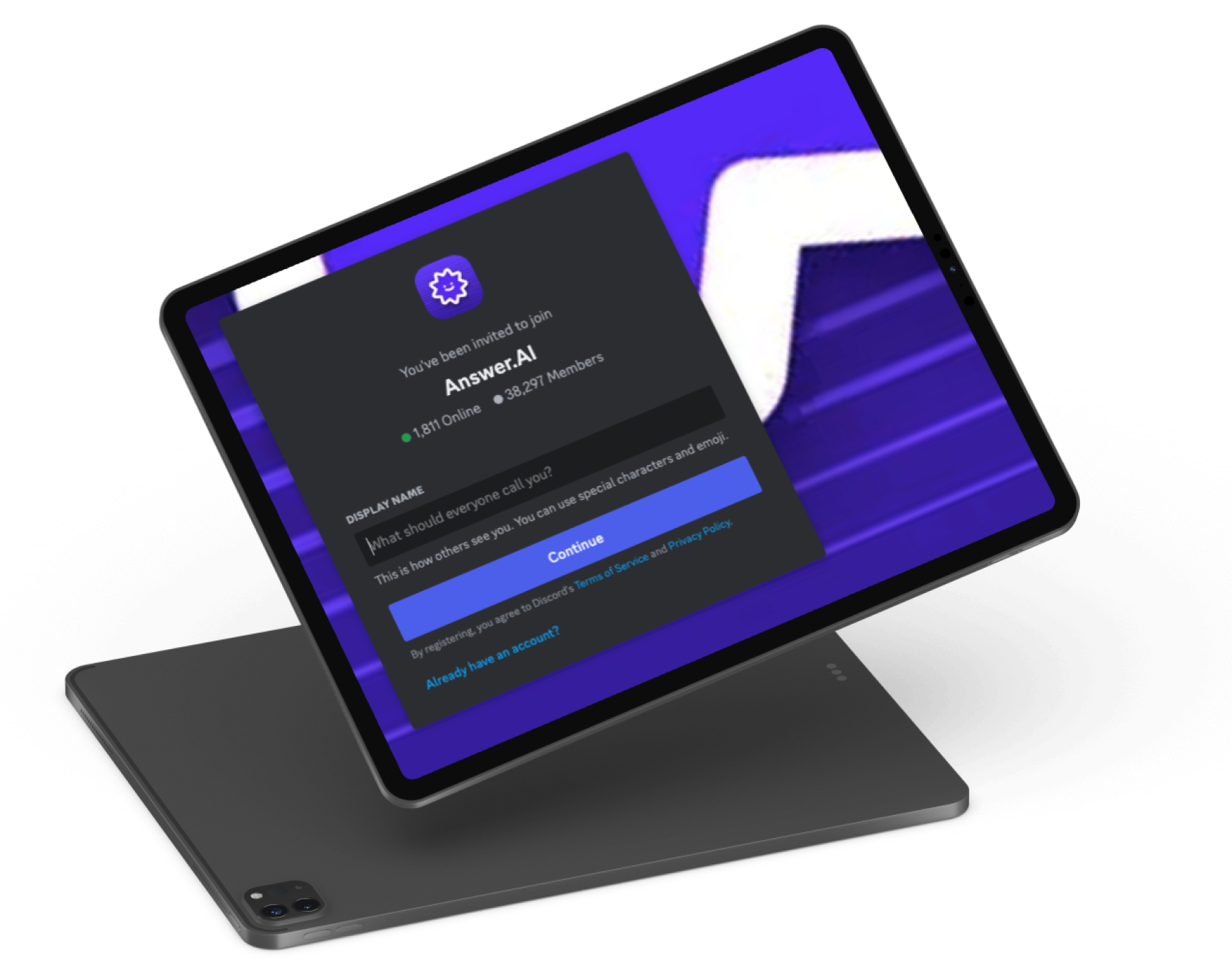Research-Backed Study Skills for High School Students

Table of contents
Studying in high school can be a challenge, especially with increasing academic demands, extracurricular activities, and the pressure to prepare for college. Developing strong study habits not only helps you achieve better grades but also builds a foundation for lifelong learning. With the right techniques, you can maximize your learning, improve retention, and boost your grades. In this article, we will share some of the most effective study tips to help high school students excel, including:
- How to create effective study environments
- Techniques to make study sessions more productive
- How to use tech without procrastinating
- How Answer.AI can help you study
Answer.AI is a leading AI platform for student success, used by over 6 million high school and college students. We have spent countless hours working directly with students and teachers to provide ways to improve students' study skills while helping them achieve academic success. We guide students through everything from college planning and financial aid to tutoring and AP test prep. You can download Answer.AI on the App Store, Google Play Store, and Chrome Web Store. You can also check out our blogs and events for more free resources.
Study Skills for High School Students #1: Study Schedules
One of the most essential strategies for improving study skills in high school is developing a regular study schedule. Consistency is key, and setting aside 50-75 minutes each day for focused study can help you stay organized and avoid last-minute cramming. When planning your schedule, keep these tips in mind:
- Be realistic about how much time you can devote daily.
- Divide your study sessions into manageable chunks to avoid feeling overwhelmed.
- Take breaks to maintain focus and prevent burnout.
- Prioritize your toughest subjects when your energy and focus are at their peak.
- Allow for flexibility to adjust when unexpected events arise.
The goal is to make studying a consistent, daily habit. However, don't hesitate to adjust your schedule as necessary, especially when priorities shift. The key is maintaining a rhythm that supports both productivity and balance.
Time Management Tips for High School Students
Managing your time effectively is crucial for balancing academic demands with extracurricular activities and personal time. Here are some practical tips:
- Use a planner or digital tool: Organize your tasks using a planner or a digital tool like Answer.AI to track deadlines and study times. This ensures you don’t miss important due dates or exams.
- Prioritize your tasks: Focus on your most important or challenging assignments first. Breaking larger tasks into smaller, manageable parts can help reduce feelings of overwhelm.
- Create a weekly study plan: Set aside time for each subject, but also schedule breaks to recharge. Balancing study time with relaxation can improve focus and prevent burnout.
By following these strategies, you’ll develop effective study habits that not only help you succeed in high school but also prepare you for future academic challenges.
Study Skills for High School Students #2: Your Study Environment
Creating an optimal study environment is crucial for enhancing focus and productivity. The right environment can differ from person to person, so it's important to experiment and find what works best for you. Whether you thrive with background noise or need complete silence, the key is crafting a space that supports your learning goals.
Finding the Right Study Setting
Everyone's ideal study environment is different. Some students focus better in busy areas like coffee shops, while others need complete quiet to concentrate. You might also prefer varying your study location depending on the task. For example, reading assignments may be easier in a quiet space, while group projects or brainstorming might benefit from a more social environment. Consider these factors when choosing your study spot:
- Noise level: Do you focus better with background noise (like soft music or ambient sounds) or in complete silence? Tools like noise-canceling headphones or white noise apps can help if you're easily distracted.
- Lighting: Good lighting is essential for focus. Natural light is ideal, but if you're studying at night, make sure your space is well-lit to avoid eye strain.
- Temperature: Your study environment should be comfortable but not too warm, as high temperatures can make you feel sleepy.
Organizing Your Study Space
Regardless of where you prefer to study, maintaining an organized and distraction-free area is vital for staying productive. Here are some tips to help you create a conducive study environment:
- Minimize distractions: Turn off notifications on your phone and limit unnecessary apps or tabs on your computer.
- Declutter your space: A clutter-free area promotes clearer thinking. Keep only the materials and tools you need for your current task on your desk to avoid distractions.
- Comfort without over-relaxation: Your chair should provide good support, and your desk or surface should be at a comfortable height. Avoid overly cozy spots like your bed, as they can make you drowsy and reduce focus.
Stock Your Space with Essentials
Having all the necessary materials on hand is another key element of an effective study space. Make sure your area is well-stocked with:
- Study tools: Pens, notebooks, textbooks, and any specific subject materials.
- Technology: Keep your laptop or tablet charged, and make sure you have access to any software or apps you might need.
- Water and snacks: Staying hydrated and having a light snack nearby can help you maintain energy during long study sessions.
Experiment to Find What Works for You
Finally, remember that your study environment should be adaptable. Some students might perform better sitting at a desk, while others may concentrate more effectively sitting on the floor or even standing. Try different setups to see what boosts your focus and productivity. You may even find that alternating environments throughout the day—like starting at a desk and finishing in a different location—helps keep you motivated.
Study Skills for High School Students #3: Reading Comprehension
Mastering reading and retention skills is crucial for academic success in high school. Effective study strategies not only help you better understand the material but also make test preparation more manageable. Below are some essential techniques to enhance your study skills:
- Choose a notetaking strategy
- Utilize active reading techniques
- Use active recall techniques
- Use visual aids and diagrams
Choose a Note-Taking Strategy
Effective note-taking is vital for retaining information and making studying easier. Instead of trying to write down everything your teacher says, focus on capturing the key points, main ideas, and examples. Here are some strategies to consider:
- Cornell Method: This note-taking system divides your page into three sections—notes, key points, and a summary. During class, take notes in the main section, write key concepts in the margin, and summarize at the bottom of the page afterward. This structure helps when reviewing and ensures that you’re actively engaging with the material.
- Active listening: Instead of just copying facts, engage with what’s being taught by noting examples, asking questions, and capturing ideas that seem confusing. This helps deepen your understanding and prepares you to ask for clarification later if needed.
- Daily review: Review your notes after class or at the end of the day. Instead of cramming the night before a test, frequent short reviews improve retention. This habit is especially helpful for building long-term understanding in subjects like math and science.
Additionally, rewriting notes in your own words can significantly improve your understanding and retention of the material. Comparing notes with classmates also helps to fill in gaps you might have missed.
Utilize Active Reading Techniques
Reading effectively means more than just going through the material—it involves engaging with the text to enhance comprehension and retention. High school students often need to process large volumes of information, especially in subjects like history, literature, and biology. Here's how to make your reading sessions more productive:
- Preview the text: Before diving in, skim the headings, subheadings, and summaries. This gives you an overview of the topic and prepares your brain for the details that will follow.
- Annotate as you read: Mark important points, highlight key passages, and jot down questions or thoughts in the margins. Engaging with the text in this way helps reinforce understanding and keeps you focused on the main ideas.
- Summarize after reading: Once you finish a chapter or section, try summarizing it in your own words. This practice helps you identify the key concepts and ensures you've grasped the material. For subjects like history, this technique is especially useful for remembering important events and themes.
Use Active Recall Techniques
Passive reading or re-reading notes isn't the most effective way to study. Instead, use active recall techniques that force you to retrieve information from memory. High school exams often require applying what you’ve learned, so mastering these techniques is crucial:
- Practice tests and quizzes: Simulate exam conditions by taking practice tests or quizzing yourself. This helps you identify areas where you need more review and reinforces memory retrieval.
- Flashcards: These are especially helpful for subjects with a lot of memorization, like vocabulary in foreign languages or historical dates. Tools like Quizlet can also make flashcards more interactive and easier to organize.
- Summarize from memory: Try recalling and summarizing key points from memory without looking at your notes or textbook. This pushes your brain to actively retrieve the information.
- Teach someone else: Explaining material to a classmate or family member helps reinforce your understanding. Teaching forces you to organize and clarify your thoughts in a way that enhances your learning.
- Join a study group: Collaborating with classmates can deepen your understanding. Group discussions allow you to hear different perspectives, fill in gaps, and reinforce your learning by explaining concepts to others.
Use Visual Aids and Diagrams
Visual aids can be incredibly helpful when studying complex subjects. High school students often benefit from visualizing information, whether it's in science, math, or history. Creating your own visual aids reinforces understanding by making you actively engage with the material:
- Diagrams and charts: Use flowcharts for understanding processes (like photosynthesis in biology), or create comparison charts (like pros and cons of different government systems in civics).
- Timelines: In history classes, use timelines to track important dates and events. Visualizing the sequence of events helps you remember them more clearly.
- Mind maps: For subjects that require brainstorming or connecting ideas (like essay planning in English), create mind maps to lay out your thoughts. This helps organize complex information visually.
- Formula sheets: In subjects like math and physics, creating a formula sheet with key equations and examples makes it easier to recall during tests. By writing out formulas yourself, you’re actively reinforcing the information.
Using visuals not only breaks up the monotony of reading and writing but also helps you understand and remember complex ideas more effectively. This approach is especially useful for subjects like science, where diagrams and charts simplify difficult concepts.
Study Skills for High School Students #4: Tech Tools
Technology offers a wide range of tools that can enhance your study skills and make learning more efficient. When used effectively, these tech tools can help you stay organized, boost focus, and reinforce your understanding of key concepts. Below are some of the most effective study techniques and tools:
- Pomodoro technique for time management
- Feynman technique for deep learning
- Quizlet and flashcards
- Focus apps for limiting distractions
Pomodoro Technique for Time Management
The Pomodoro Technique is a simple yet powerful way to manage your study time and avoid burnout. It involves studying for 25 minutes, followed by a 5-minute break. After completing four “Pomodoros,” take a longer break of 15 to 30 minutes. Here’s how to implement it:
- Set a timer: Commit to focusing only on your study task for each 25-minute block. Use the break to stretch, grab a snack, or check your phone for a quick refresh.
- Stay consistent: This technique helps you maintain focus during long study sessions and prevents mental fatigue, making it easier to stay motivated.
Feynman Technique for Deep Learning
The Feynman Technique is a powerful way to understand and retain complex information by teaching it to someone else. Here’s how you can use it effectively:
- Explain the concept in your own words: Pretend you're teaching a study partner, a family member, or even an imaginary student. This forces you to simplify the material and identify any gaps in your knowledge.
- Build confidence: The act of teaching not only reinforces what you've learned but also boosts your confidence in the material.
Quizlet and Flashcards
Flashcards and practice tests are proven methods for mastering facts and concepts. They’re especially useful for subjects that require memorization, like biology, history, or language classes. You can use tools like Quizlet to made flashcards based on class subjects. But if manually adding each flashcard is taking more time than you would like, you can also use Answer.AI's flashcard feature that let's you take a picture of anything and immediatley generates customized flashcards. Pretty cool, right?
Focus Apps for Limiting Distractions
Maintaining focus while studying can be difficult with distractions like social media and notifications. Apps designed to block distractions can be very helpful.
While tech tools can greatly enhance your study habits, it’s important to use them wisely. Be mindful of how you interact with technology to prevent it from becoming a distraction:
- Turn off notifications: Make sure to turn off social media notifications or other alerts that can pull you away from your study session.
- Limit social media: Stick to designated study times and reward yourself with short social media breaks only after you’ve met your study goals.
Why Answer.AI Is the Best for Study Skills for High School Students
You now know some study skills for high school students. But how do you apply them in daily life, and what tool should you use to make sure you are being your most productive self? We might be biased, but Answer.AI is probably your best bet. Rather than having to go to different apps to enhance each study skill, Answer.AI is the one stop shop where you get access to numerous features that solve your academic stress. Some features you can look out for are:
- Instant Flashcards: Creating flashcards for each subject can be tedious and time consuming. That's why we created our Flashcard feature, where you simply capture an image of your history textbook, and Answer.AI will promptly generate a set of flashcards for you.
- Math Camera: With our math camera, users can access step-by-step explanations and solutions to any math problem. We'll also provide recommended videos and resources so you can understand concepts better.
- AP Quest: Make your AP exam prep more fun with our new section! This section features a wide range of multiple-choice questions covering subjects such as English, History, and Social Science.
- Study Group: If you are someone who enjoys studying with friends rather than working alone, then this feature is for you. You can make study groups in the app, have group calls, and ask your AI tutor any questions in the chatroom.
- AI Counselor: College application season can be stressful and overwhelming, and it can be hard to get the resources and attention your app deserves. With AI Counselor, you'll get personalized recommendations for colleges and scholarship opportunities.
- Voice Chat: Now, you can simply give our AI Tutor a ring. Simply use our voice chat feature and get immediate help for any question, anytime.
Mastering effective study skills is essential for academic success in high school and beyond. By learning how to manage time effectively, take organized notes, set goals, and take care of your mental health, you can improve not only your grades but also your overall learning experience. With practice and consistency, these skills will carry over into college and your future career, setting you up for long-term success. Start small, build healthy habits, and remember that studying smart is often more important than studying hard.
With Answer.AI literally in your back pocket, high school and college students can achieve more in their coursework, careers, and beyond without ever burning out. With over 6 million people in our community, we are here so you can ask anything, and learn everything. You can download Answer.AI on the App Store, Google Play Store, and Chrome Web Store. You can also check out our blogs and events for more free resources.
See Related Articles

Back-to-School: Preparing for a Successful Year

Benefits Of Studying In Groups

2024 Answer.AI Report Card

Join our Discord community
Get updates on upcoming webinars, live discussions, peer support, and more.
Join the community




